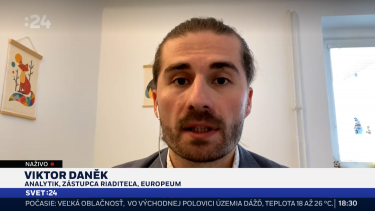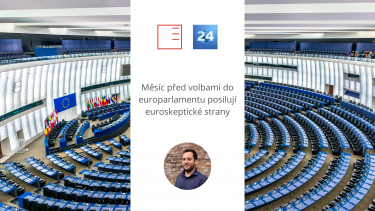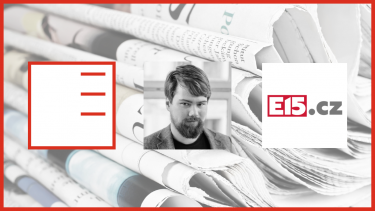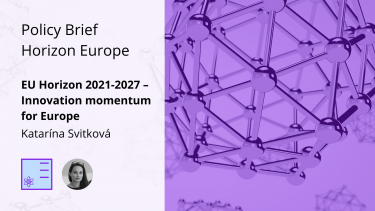RTVS | Does von der Leyen have a clear opponent after the Spitzenkandidaten debate?
Five candidates for the post of European Commission chief clashed in a Europe-wide debate on Thursday. Two factions did not field a candidate. The system of spitzenkandidaten, i.e. the leading candidates of each group for the post of president of the European executive, was created as an effort by MEPs to increase transparency in the filling of the highest posts in the European Union, which clearly includes the president of the Commission. Who will be the one who will form the majority after the elections and does the current head of the Commission, Ursula von der Leyen, have a significant opponent among the other spitzenkandidaten? Viktor Daněk, deputy director of EUROPEUM Institute, analysed the debate for RTVS.
Show moreČT24 | Euroskeptic parties strengthen a month before the European Parliament elections
The European elections are about a month away. Czechs will vote for 21 of the 720 MEPs. This will be the first election since Brexit, the Covid-19 pandemic or the start of the Russian invasion of Ukraine. Turnout is expected to be higher than in the last elections five years ago, with right-wing and Eurosceptic parties strengthening. Žiga Faktor, deputy director and head of EUROPEUM Institute's Brussels office, described the possible reasons for daily broadcast of Czech TV.
Show more
Právo | Von der Leyen wants to continue leading the EU
As expected, Ursula von der Leyen has confirmed her interest in continuing as President of the European Commission. Since her arrival, she has faced crises such as Brexit, the global pandemic, the battle over vaccines and the Russian invasion of Ukraine. The announcement of her candidacy was analysed by Viktor Daněk, deputy director of the EUROPEUM institute, in Deník Právo.
Show moreEU MONITOR | THREE RESPONSES TO DISINFORMATION IN THE EUROPEAN UNION
Disinformation and foreign interference have been concerns in global politics for centuries, but social media algorithms have made the current threat more dire as they amplify content based on human frailties such as our obsession with negativity and outrage. Russian interference in the 2016 US federal election and other elections and referenda in at least twenty countries between November 2016 and April 2019, including the Brexit referendum, the French and German elections, and the Ukrainian power grid cyber-attacks, have highlighted the potential for foreign governments to alter the results of an election or undermine democracies using social media and other means. Writes Jakub Ferenčík in his last EU MONITOR.
Show more PDF
E15.cz: The Brexit deal is in danger of collapse. The dispute between Brussels and London can be settled by the Czechs
Martin Vokálek, executive director of the Europeum Institute for European Policy, commented for E15 on the tense situation between the European Union and the UK in the area of economy and trade. In particular, the problematic region of Northern Ireland and compliance with the so-called Good Friday Agreement. The emergence of new tariff barriers between Britain and the European bloc is thus clearly a real threat.
Show more
ČRo Plus: The European Commission has proposed removing part of the controls on goods in trade between Northern Ireland and the rest of the United Kingdom
The head of our Brussels office, Žiga Faktor, commented on Český Rozhlas Plus the European Commission's proposals for changes to the Brexit agreement.
Show more
POLICY BRIEF: EU Horizon 2021-2027 – innovation momentum for Europe
Our Associate Research Fellow Katarína Svitková wrote the first article for the new EUROPEUM publications series: 2021–2027 Horizon Europe. In a policy brief Katarína summarises the objectives of Horizon 2021-2027 and introduces the "Innovation” pillar of the European Union funding scheme for the following years.
Show more PDF

Language diversity in a post-Brexit Union: a French perspective
Rose Hartwig-Peillon in her blog wrote about language diversity from a French perspective.
Show more
Aljazeera: ‘Better off here’: Returnee Czechs happy to be home after Brexit
Our head of research and deputy director Christian Kvorning Lassen comments on the post-brexit return of Czechs to their homeland.
Show moreIDM: Brexit – A mess in the institutional EU Framework?
Our research fellow Danielle Piatkiewicz was a guest on the IDM Vienna podcast. The main topic of the podcast, which focuses on the Central Europe, was Brexit and the EU institutional framework.
Show moreStaroměstské náměstí 4/1
Prague 1 - Staré Město
110 00
tel.: +420 212 246 552
email: europeum@europeum.org
https://www.europeum.org









